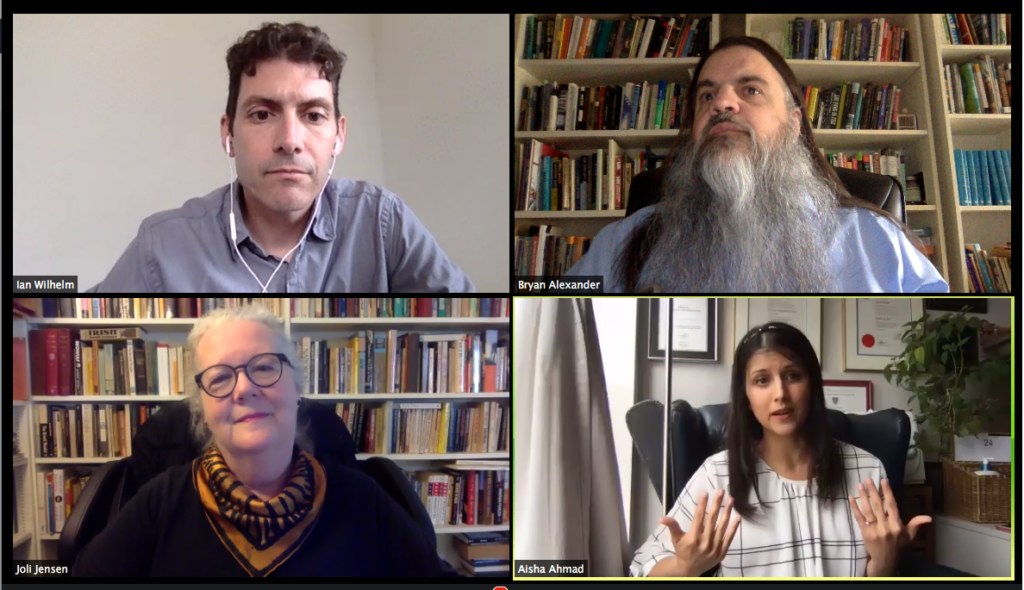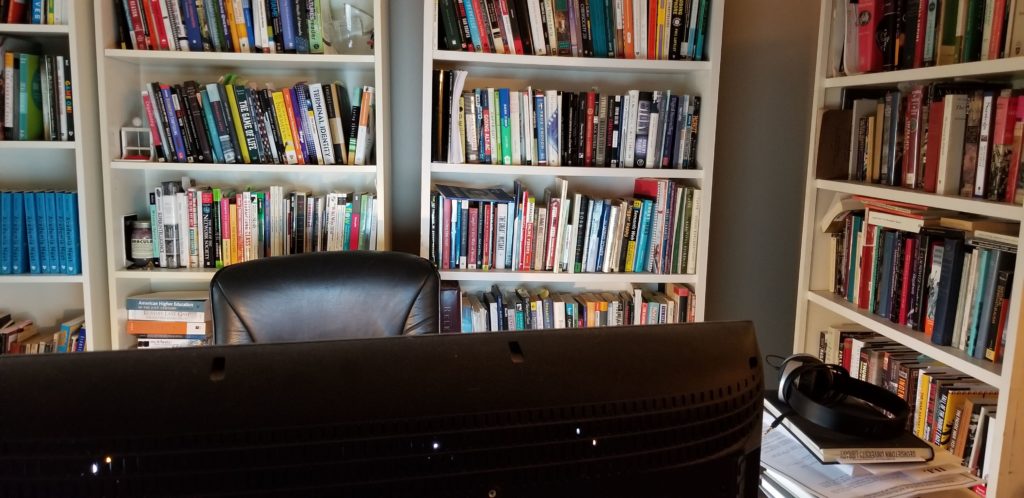Happy Easter to readers who celebrate that holiday.
After weeks of analysis, forecasting, and research-sharing, I wanted to take this weekend moment for a personal post, to update you on what I’m up to and how I’m doing. Analysis, forecasting, and research-sharing will return with the next post.
As always I want to be transparent and open.
For the past month my family has been in quarantine. We started this far in advance of our state (Virginia) governor’s announcement, thanks to my wife’s careful, EMT-professional attention and planning. She stocked up the house with plentiful supplies and locked us down.
As a result, we’re all physically healthy. A few of us get seasonal allergies – it’s springtime in northeast Virginia, so every plant-based lifeform is blooming ecstatically – and that’s about it.
Mentally, it’s more complicated. Our son, Owain, prefers living with us to living in his university dorm, and he’s taking classes online, which is a mixed blessing. For the live video sessions (Microsoft Teams) he heads into our recording booth. Our daughter, Gwynneth, continues to work at what has become an essential job: security for datacenters. Depending on what’s in the news and how much we partake of it, all of us are susceptible to bouts of gloom and frustration, like pretty much everyone else.
Me?
It’s very strange to not be traveling all over the place. I realize now how much of my life has been arranged around the next two trips in line. Over the past year I’ve had 1-6 trips/month. Not doing any of that is a bit disorienting. To be honest, not having to fly in the United States is actually a big relief.
Now my work has settled down spatially to wherever my laptop is. Where that is, most of the time, is my office desk and its big screen display, along with the book shelves. I take detours to the home recording booth for audio or to other parts of the house, for variety’s sake.
I’m trying to keep my health up. I walk when I can (when there aren’t many people outside) and use the exercise bike+ desk about once/day. Pullups are a daily thing, to the amusement of our cats, who are delighted we’re spending more time attending to their needs. I continue with my 2/3rds vegan diet – Mark Bittman‘s “VB6” – and have pushed it further, with several days in a row that are entirely vegan. I’m learning about veganism and have lost about 15 lbs. I can say more about this dietary bit for curious folks.
Meanwhile, my work hasn’t stopped. Quite the opposite. I’m still working the future of higher education . I keep reading about the necessity of self-care, the importance of reducing expectations, the health benefits of getting rest, the politics and sanity of pausing to reflect… and I’m doing none of those things.
That’s because I’ve been working up to 16 hour days, 7 days a week, for what must be the past month, although it’s hard to tell since things are a bit blurry.
Why?
There’s the mission, first of all. I help people think about the future of higher education. That’s what I do. That future has just been beaten with a stick, had gasoline poured on it, and shoved down a rocky slope into what looks like a foggy abyss. I have to work this. This means researching like mad, tracking how academia is reacting to the pandemic. Some of that work is very public, like the various resources I’ve aggregated, a bunch of blog posts, media interviews, and the many live video events I’ve hosted. Some is quieter, including connecting with my hundreds of established clients as well as a swarm of new ones. I’ve helped clients translate face to face events online and rethink their strategies. A lot of these institutions – these people – are suffering. I help as best I can.
Second, some of my preexisting work has survived the global plague. Some of that work has actually become more intense. Academia Next continues to make its way in the world, eliciting feedback and conversation, plus some video events. My next book proposal is in an excellent publisher’s hands, having survived a first round of peer review; with luck I’ll post about getting awarded a contract. My current Georgetown seminar (subject: education and technology) is now online, and we all know well now that shifting a face-to-face class into a wholly digital format is not a trivial matter. I’m scheduled to teach a summer class (subject: gaming in education), which means I have to redesign the whole thing for being online. Other work was starting up once COVID-19 hit, and not all of it went away.
But some did go away, and in a big way, which brings me to the third reason for overwork. The majority of our business revenue came from in-person, face to face events, like keynotes, presentations, workshops, and on-site consultations. Here’s what 2019 looked like:
Over the past month most of those engagements just evaporated. Some were postponed to 2021. Only a few shifted online, and some of those with a fee reduction.
You can see what that does to our bottom line. That’s a business collapse in the wings. The proverbial wolf has arrived at the door.
So we pivoted.
A month ago I realized that if nobody was going to be doing face to face events for a while, and many have translated those into videoconferencing, then that’s where my work had to focus. If that’s where academics and others interested in the future of higher education had moved to, then I had to follow. And not just follow.
You see, I’ve been conducting, organizing, and participating in live video events since the 1990s. The Future Trends Forum started in 2016 and has held weekly sessions nonstop. I’ve been blogging about it. Since the coronavirus reached pandemic levels I’ve hosted or cohosted up to five events per week for hundreds or thousands of people at a time. I’m a good moderator and want to apply that skill to making conversations happen. We need this now, as COVID-19 upends the world.
Each session takes time. There’s the live event itself, of course, but also a lot of preparation: setting up logins or registration, finding fine guests, outreach over email and social media, helping people with tech glitches. There’s some juggling of technical details, too, as I have used at least seven different video platforms recently (Zoom, Shindig, WebEx, On24, Adobe Connect, Blackboard Collaborate, BlueJeans). Afterwards there’s a lot of followup with individuals (which I recommend for any event) as well as creating a video recording. The last bit for me can mean downloading a raw video file, editing it into shape (cutting out dead bits, adding title cards), uploading it to YouTube, then sharing it with participants and the world. I’m basically doing video production plus working in each video itself. Doing five of these a week is a serious job by itself.

From a Chronicle of Higher Education conversation with cohost Ian Wilhelm and guests Joli Jensen and Aisha Ahmad.
This month it’s starting to pay off. I think I’ve helped make some useful conversations happen. And now several clients want me to do these for them professionally. If that works and leads to more such paid videoconference work, it might become a central part of Bryan Alexander Consulting’s offerings in 2020 and beyond.
Meanwhile, non-video, non-face-to-face projects continue. We just published the April 2020 FTTE report, and subscriptions to it keep growing. I share content and discussion with supporters on Patreon, and those numbers are also rising. Royalties trickle in from book sales. And I’m working up an ebook on how to offer good webinars. (Dear reader, you are very welcome to support each and all of those efforts.)
So that is why I’m working insanely long hours. History has happened, and we’re responding as best we can. If all goes well we can help people, advance conversations, and survive or even thrive.
And how’s by you?








“There’s the mission, first of all. I help people think about the future of higher education. That’s what I do. That future has just been beaten with a stick, had gasoline poured on it, and shoved down a rocky slope into what looks like a foggy abyss. I have to work this. This means researching like mad, tracking how academia is reacting to the pandemic.”
Please! Let’s not forget the enormous scholarship of the past, which I became aware of when Y2K failed to materialize. There is no reason to re-invent the wheel.
https://en.wikipedia.org/wiki/Enrico_Quarantelli at the Disaster Research Center.
http://drc.udel.edu/files/2014/10/ELQ-2009-1zoic97.pdf that’s in the wayback machine.
Thomas Drabek, and especially Anthony F. C. Wallace, indispensible.
“Disaster research” In E. Borgatta and M. Borgatta (eds.) Encyclopedia of Sociology. NY.: MacMillan, 1992): 492-498.
There is a great deal of scholarship to attend to, Glen.
Thank you for pointing out one of the scholars.
The other factor is the “normal accidents” aspect, courtesy of Chuck Perrow, that plays a role — https://en.wikipedia.org/wiki/Normal_Accidents
“Perrow identifies three conditions that make a system likely to be susceptible to Normal Accidents. These are: The system is complex // The system is tightly coupled // The system has catastrophic potential.”
Perrow vehemently denied the housing bubble (at least) and the financial collapse preceding the Great Recession was a “normal accident” — but his students argued it WAS a “normal” accident. Whatever we have now, it is clear, IS a “normal accident.”
I wish I had access to my files and my library, but a Category 5 hurricane has put that out of reach for the moment. Sorry if my memory of twenty years ago has holes.
This reminds me of Tainter’s work on complex societies.
I am so sorry to hear about your library and files!
“There’s the mission, first of all. I help people think about the future of higher education. That’s what I do. That future has just been beaten with a stick, had gasoline poured on it, and shoved down a rocky slope into what looks like a foggy abyss. I have to work this. This means researching like mad, tracking how academia is reacting to the pandemic.”
Please! Let’s not reinvent the wheel by neglecting the vast scholarship of “disaster theory” over the past 3 decades. The founder of the Disaster Research Center,
https://en.wikipedia.org/wiki/Enrico_Quarantelli also at
https://web.archive.org/web/20150416025743/http://drc.udel.edu/files/2014/10/ELQ-2009-1zoic97.pdf
Thomas Drabek, https://en.wikipedia.org/wiki/Sociology_of_disaster
A lot has happened since Y2K never materialized and sent me down this rabbit hole.
I never would have guessed there would be a time to dust off old files!
But a lot has changed in twenty years!
https://www.worldcat.org/search?q=kw%3Adisaster+theory&qt=advanced&dblist=638
Thank you for those pointers, Glen.
I would add: the profession of disaster management.
The Disaster Research Center that was started in 1963 and claims an archive of more than 40,000 articles and studies related to disasters.
https://www.drc.udel.edu/about/news
https://www.drc.udel.edu/news/Pages/UD-expert-talks-return-to-normal.aspx
https://www.drc.udel.edu/sitemap
Thank you!